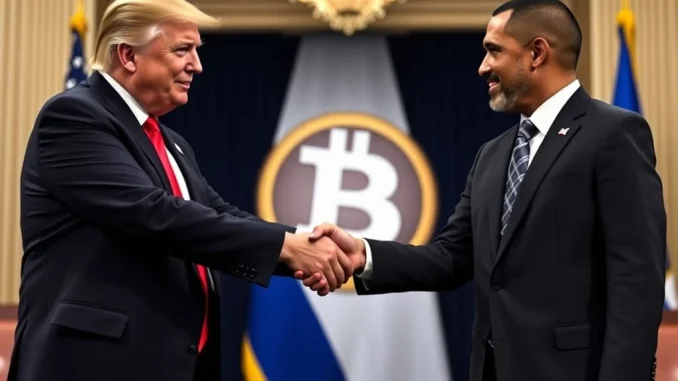
Hold onto your hats, crypto enthusiasts! A seemingly routine meeting between former U.S. President Donald Trump and El Salvador’s President Nayib Bukele is sending ripples through the Bitcoin world. Why? Because El Salvador isn’t just any country; it’s a nation that has boldly embraced Bitcoin as legal tender and currently holds a significant Bitcoin treasury. Let’s delve into why this meeting is more than just a photo op and what it could mean for the future of cryptocurrency.
Why is Everyone Talking About This Trump – El Salvador Meeting and Bitcoin?
On the surface, a meeting between a former U.S. president and the leader of a Central American nation might seem like standard diplomatic fare. However, when you factor in El Salvador’s pioneering stance on Bitcoin adoption, things get interesting. El Salvador, under President Bukele, made history by becoming the first country to adopt Bitcoin as legal tender in September 2021. This move was both lauded and criticized, making El Salvador a focal point in the global cryptocurrency conversation.
Here’s what makes this meeting noteworthy for the crypto community:
- El Salvador’s Bitcoin Bet: El Salvador’s commitment to Bitcoin is not just symbolic. The nation holds a substantial amount of Bitcoin, currently reported to be around 6,146.18 BTC. This is a significant national reserve in the digital asset world.
- Trump’s Evolving Crypto Stance: While in office, Donald Trump was not known as a Bitcoin enthusiast, even expressing skepticism towards cryptocurrencies. However, the political landscape and individual stances can evolve. A meeting with a pro-Bitcoin leader like Bukele could signal a shift or at least a deeper engagement with the topic.
- Global Implications: El Salvador’s experiment with Bitcoin is being closely watched by other nations, particularly developing countries. The success or challenges faced by El Salvador can influence other countries’ decisions regarding digital currencies.
El Salvador’s Bold Bitcoin Adoption Strategy: A Quick Recap
For those who might be new to the story, let’s quickly recap El Salvador’s journey with Bitcoin:
| Key Milestone | Details |
|---|---|
| June 2021 | El Salvador announces plans to adopt Bitcoin as legal tender. |
| September 7, 2021 | Bitcoin becomes legal tender in El Salvador alongside the US dollar. |
| Bitcoin Bonds (Volcano Bonds) | El Salvador plans to issue Bitcoin-backed bonds to fund infrastructure projects and further Bitcoin adoption. |
| Bitcoin City | Ambitious plans announced to build a Bitcoin City, powered by geothermal energy from a volcano. |
| Bitcoin Purchases | El Salvador has been regularly purchasing Bitcoin, taking advantage of price dips, and holding them in their national reserves. |
President Bukele has been a vocal advocate for Bitcoin, arguing it can bring financial inclusion, reduce reliance on traditional financial systems, and boost the Salvadoran economy. While the experiment has faced criticism from international financial institutions like the IMF, Bukele has remained steadfast in his commitment.
What Could Trump and Bukele Discuss Regarding Cryptocurrency?
While the exact agenda of the meeting remains undisclosed, we can speculate on potential discussion points, especially concerning cryptocurrency:
- El Salvador’s Bitcoin Experience: Bukele could share insights into El Salvador’s experience with Bitcoin adoption – the benefits, challenges, and lessons learned. This first-hand account could be valuable for understanding the real-world implications of national Bitcoin strategies.
- Economic Impact: Discussions could revolve around the economic impact of Bitcoin on El Salvador, including remittances, tourism, and potential for attracting foreign investment.
- Regulatory Frameworks: The conversation might touch upon regulatory approaches to cryptocurrencies. El Salvador has taken a relatively permissive stance, and exchanging notes on regulatory environments could be of interest.
- Geopolitical Implications: With the growing global interest in digital currencies, the geopolitical implications of Bitcoin and other cryptocurrencies could be a topic of discussion, especially considering the US’s role in international finance.
The Future of Bitcoin Adoption: Is El Salvador a Blueprint?
El Salvador’s Bitcoin adoption experiment is undoubtedly a landmark event in the history of cryptocurrency. Whether it becomes a blueprint for other nations remains to be seen. Here are some key considerations regarding the future of national Bitcoin adoption:
- Economic Stability: The volatility of Bitcoin remains a concern for national economies. Managing this volatility and ensuring economic stability is crucial for any country considering Bitcoin adoption.
- Financial Inclusion: Bitcoin’s potential to enhance financial inclusion, especially in unbanked populations, is a significant draw. El Salvador aims to leverage Bitcoin to improve financial access for its citizens.
- Technological Infrastructure: Successful Bitcoin adoption requires robust technological infrastructure, including internet access, digital literacy, and secure payment systems.
- Regulatory Clarity: Clear and supportive regulatory frameworks are essential to foster innovation and manage risks associated with cryptocurrencies.
- Global Acceptance: Wider global acceptance and interoperability of Bitcoin are important factors for its long-term viability as a national currency or reserve asset.
What’s Next for Bitcoin and El Salvador?
The meeting between Trump and Bukele, while seemingly informal, underscores the growing relevance of Bitcoin news on the global stage. It highlights how even nations are now part of the cryptocurrency narrative. El Salvador’s journey with Bitcoin is ongoing, and its outcomes will significantly influence the future trajectory of cryptocurrency adoption worldwide.
Keep an eye on El Salvador – they are not just holding Bitcoin; they are actively shaping the conversation around its potential and challenges. And as for the Trump-Bukele meeting, it’s a reminder that in the fast-paced world of crypto, unexpected alliances and discussions can spark significant shifts.



